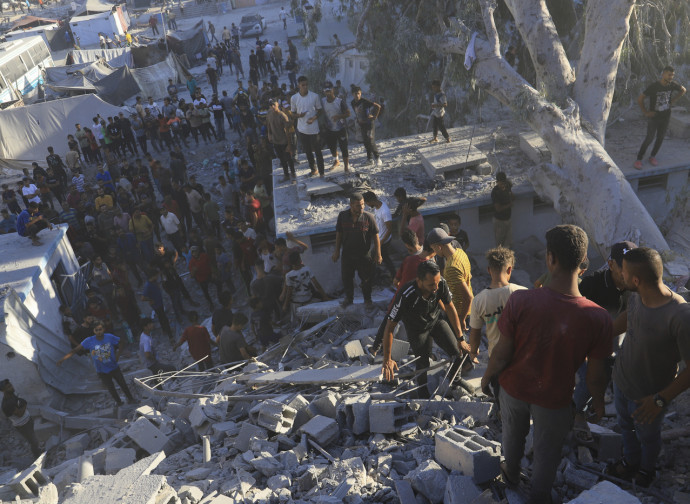New Israel-Vatican fallout
Nine months since the beginning of the war between Hamas terrorists and Israel, the population of the Gaza Strip is at breaking point. The Israeli ambassador to the Holy See responds sharply to a document by the Justice and Peace Commission.

After nine months of the war, the people of Gaza are in danger of losing their identity, no longer have homes where they can live safely and food to eat. There are daily reports of hunger and famine. Air raids, tank bombardments and attacks by Israeli ground forces searching house to house for Hamas militiamen have rendered this land uninhabitable. From the early hours of dawn, inhabitants of the Strip wander among the ruins in search of food. The haunting faces of thousands of innocent people, deliberately starved and thirsty, look like the tragic masks of the survivors of Treblinka and Dachau.
The war continues unabated, sowing death and destruction. An Israeli raid on the Al-Jaouni school in Nuseirat, housing displaced people, caused the death of thirteen people, mostly women and children. The Nasser hospital, the last one still operating in Khan Younis, and the Kuwait field hospital, near Rafah, will close their doors within a few days because they lack fuel to power their generators. The list of the dead grows longer day by day. From 7 October 2023 to date, according to the most recent reports, updated days ago by Hamas, the number of victims exceeds 38,000 and the wounded over 87,000.
Meanwhile Israel is fighting another parallel war. More silent, without clamour. It is that waged between the Orthodox Jews on one side, and the soldiers of the army marked by the Star of David. The city of Jenin, a West Bank locality on the outskirts of Ramallah is under siege.The latest attack by the Israel Defence Forces (Tsahall) resulted in a massacre. "A premeditated action. There is not a day now that soldiers do not raid our city,' said Mayor Nidal Obeidi. The death toll since 7 October stands at 505 Palestinians, killed by the army and settlers, while water and electricity services are often interrupted for many hours a day. In Jenin alone, over three thousand people have been evacuated and have found refuge in other areas of the country. In a video, circulating on the net, Israeli soldiers are clearly seen throwing tear gas inside the city hospital. The Catholic church of the Patriarchate also suffered extensive damage. And the clashes are spreading outside the West Bank. Tension is rising in East Jerusalem, particularly in the Silwan, Issawiya, and Wadi Joz neighbourhoods and in the refugee camps of Shufat and Abu Dis. A serious attack took place in Tel Aviv, where a car ploughed into the crowd, injuring seven people.
On June 30, the Justice and Peace Commission, which operates within the Assembly of the Catholic Ordinaries of the Holy Land, condemned the continuation of the war, the high number of victims among the inhabitants of Gaza, the failure to release the Israeli hostages still in the hands of Hamas militiamen, and what is happening in Israeli prisons, where Palestinians are being held without trial. "We feel the need to denounce the misuse of a term used in the Catholic doctrine of 'just war'," write the members of the Justice and Peace Commission. After the horrific attacks on 7 October against military installations, residential areas and a music festival in southern Israel by Hamas and other militiamen, and the catastrophic war waged in response by Israel, Catholic leaders, starting with Pope Francis, have continually called for an immediate ceasefire and the release of all hostages".
The document continues: "Just wars must clearly distinguish between civilians and combatants, a principle that has been ignored by both sides in this war with tragic results. Just wars must also employ proportionate use of force, something that cannot easily be said of a war in which the Palestinian death toll is tens of thousands higher than Israel's, and in which a clear majority of Palestinian victims are women and children'. It goes on to quote the Pontiff again, who during a general audience, four days after the Hamas attack, recognised the Israeli right to self-defence: "Whoever is attacked has the right to defend himself". The members of the Justice and Peace Commission also pointed out that Pope Francis, during an interview, certainly reiterated that it is right and legitimate to defend oneself, and this is the case with self-defence, but this is to avoid justifying wars, which are always wrong.
Clear words, calling, once again, for peace in that tormented land. On July 2, the Israeli ambassador accredited to the Vatican, Raphael Schutz, who, in a few months, will end his mandate at the Holy See, replied: "The document's statement that the principle of the distinction between civilians and combatants has been ignored by both sides in this war, creates a false symmetry that reflects prejudice and one-sidedness. The facts show that Israel is doing its best to make the above distinction, while Hamas is doing the opposite, deliberately incorporating civilians and combatants as a central element in its combat strategy, knowing that there will be those who will blame Israel. The way the document uses the term 'just war' is not compatible with the international law that Israel respects and abides by'.
The Israeli ambassador, however, makes no reference to two facts that definitely do not fall under the definition 'just war'. The first, when 17 people were killed in the Israeli bombing of the Greek Orthodox Church of St. Porphyry in the historic quarter of Gaza City on 19 October. During that raid, the church offered shelter to 411 refugees, among whom were five members of Caritas Jerusalem, along with their families. The second fact refers to the killing of a mother and daughter. Their names were Nahida and Samar Anton, and they were killed before Christmas by an Israeli army sniper in the Catholic parish in Gaza, where most of the Christian families had taken refuge. The two women were shot as they moved inside the parish towards the nuns' convent. One was killed as she tried to carry the other to safety. And seven others were wounded by Israeli military snipers as they tried to protect others inside the church.
During a ceremony at the Jewish Museum in Rome to commemorate 76 years of the State of Israel on June 6, the ambassador had already admitted that after 7 October, at times, Israel and the Holy See did not perceive the reality in the Middle East in the same way. Listening to him was, among others, the Vatican's Secretary for Relations with States and International Organisations, Archbishop Paul Richard Gallagher. "With less than three months to go before the end of my term of office and the beginning of my retirement, it seems to me that in the short term a process of catching up is necessary, and before moving on, it may be necessary to discuss some basics," Schutz suggested. In this sense, perhaps the 60th anniversary of the Nostra Aetate declaration next year will 'serve as a conceptual framework for this process'.
Archbishop Gallagher, speaking, could only reiterate his condemnation of what happened on 7 October; indeed, terrorism is never the solution. He recalled the Pope's closeness to the families of the hostages, whom he met individually and in groups. "But three are the Pontiff's requests to stop the conflict: a ceasefire, the release of the hostages, and the delivery of humanitarian aid," the high prelate said, also emphasising that Vatican neutrality is not indifference, on the contrary: the Holy See's doors are not closed to anyone.

